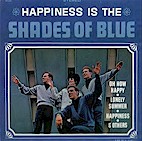
Genre: soul
Rating: *** (3 stars)
Title: Happiness Is the Shades of Blue
Company: Impact
Catalog: 1001
Year: 1965
Country/State: Detroit, Michigan
Grade (cover/record): VG/VG
Comments: minor ring wear and soiling on back cover
Available: 1
GEMM catalog ID: 4372
Price: $10.00
Cost: $66.00
This one's interesting on a couple of counts, including the fact taht in spite of their 'dorkster' looks, this outfit is one of the most impressive blue-eyed soul outfits you'll ever hear and the fact they were discovered by Edwin Starr !
Originally known as The Domingos, Linda Allen, Ernie Dernai, Bob Kerr and Nick Marinelli got their start playing dances and clubs around suburban Detroit. Interested in scoring a recording contract they auditioned for a couple of local labels, including Golden World. While Golden World turned them down, the quartet became friendly with producer John Rhys and Edwin Starr (then recording Golden World). Starr offered the group a tune he'd recently written and with help from Rhys, they quickly recorded a demo of the track. Offered to Impact Records president Harry Balk, the group (now rechristianed 'The Shades of Blue') were quickly signed to a contract. Released as a single 'Oh, How Happy' b/w 'Little Orphan Boy' (Impact catalog number 1007) provided the group with a surprising top-20 pop hit. A quickly released follow-on 'Lonely Summer' b/w 'With This Ring' (Impact catalog 1014) also went top-100.
As was standard marketing procedure, Impact rushed the group back into the studio to record a supporting album. Produced by Rhys, 1966's "Happiness Is the Shades of Blue" had a strange schizophrenic feel. Like most supporting albums, quite a bit of the material had a throwaway feel to it. That said, about 75% of the album was quite worthwhile. Lead singer Marinelli had a voice that was quite commercial and highly versatile, perhaps helping to explain why the set was divided between top-40 styled pop and soul-influenced numbers. At least to my ears, the group were at their best on blue-eyed soul numbers such as 'Millionaire', 'A Way To Love You' and 'Exception To The Rule'. Elsewhere the album also included the two earlier singles (all four 'A' and 'B' sides)
"Happiness Is the Shades of Blue" track listing:
(side 1)
1.)
Millionaire (Dave Crawford) - 2:47
2.) World In His Hands (John Rhys) - 2:43
3.) The Night (The Shades of Blue) - 2:25
4.) With This Ring (John Rhys - D. Browner) - 2:45
5.) Little Orphan Boy (John Rhys - Theodore - Sabran) - 2:14
6.) Happiness (John Rhys) - 2:18
(side
2)
1.) Exception
To The Rule (Bob Stone) - 2:08
2.) A Way To Love You (D. Browner) - 3:14
3.) Lonely Summer (Edwin Starr) - 2:01
4.) Peace Of Mind (P. Crayton - E. Crayton) - 2:23
5.) Oh How Happy (Edwin Starr) - 2:16
Over the next year the group recorded two non-LP singles:
- 1967's 'How Do You Save A Dying Love?' b/w 'All I Want Is Love' (Impact catalog number 1026)
- 1967's 'Penny Arcade' b/w 'Funny Kind Of Love' (Impact catalog number 1028)
The group
continued to be popular in their native Detroit for several years,
eventually calling it quits in 1970.